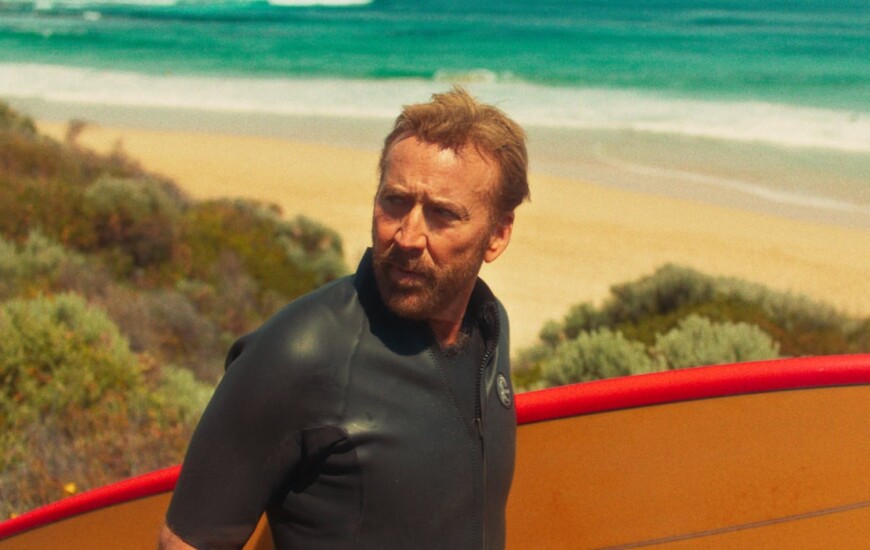Nicolas Cage catches a wave in brilliantly odd The Surfer
Mike Finnerty 06 May 2025
French auteur Jean-Luc Godard once said that all you need to get a film financed is “a girl and a gun.”
The modern-day version seems to be getting Nicolas Cage on board.
There are three kinds of Nicolas Cage films; the serious, big-budget Hollywood action movies like Face/Off and Con Air and Oscar movies like Leaving Las Vegas and Adaptation, movies Nicolas Cage made because he had to pay off a debt and movies Nicolas Cage made where he simply wants to play a weirdo.
The Surfer, directed by Dubliner Lorcan Finnegan, is in the latter camp.
After a fallow period in the 2010s where Cage made some absolute dreck, Cage has made a quiet comeback in recent years thanks to films like Pig, Mandy and Longlegs.
Cage, by his own admission, is now “more selective” in his roles after his streak of making five bad movies a year, and The Surfer is the latest in a stellar run of performances from everyone’s favourite oddball leading man.
The Surfer is a psychological thriller in which Cage plays an American man who returns to his childhood town in Australia in order to buy his old family home and catch some waves.
Director Finnegan gets every last cent out of his leading man, and then some; Finnegan relishes putting Cage through different levels of hell throughout the film.
Cage’s character never catches a break, and Cage’s patented mania is deployed beautifully here.
The return to his hometown is spoiled by surf “localists” who are doing everything in their power to make sure the local beach is used and enjoyed by locals only; Cage’s American sheen and accent makes him stick out like a sore thumb, and this creates instant tension.
The novelty of The Surfer is that roughly 75% of the film takes place in the car park beside a beautiful Australian beach, and Finnegan uses the space and geography of the car park to get a glimpse into Cage’s declining mental state.
A comedy of errors befalls Cage; he keeps getting hassled by aggressive Aussie teens who vandalise his car, he’s not allowed onto the beach because he’s not a local, his phone battery dies when he’s waiting for a vital phone call, he doesn’t have access to food or water, the script does great work in really tormenting Cage until he eventually snaps.
The most appealing part of The Surfer is waiting to see just how far the rubber band stretches; at some point, you know Cage will give us one of his patented freakouts, and when it happens, it is glorious.
The Surfer has a vibe that can diplomatically be described as “weird” by the layman and “gonzo” by people with an arts degree.
The credits, psychedelic score and choice to shoot dialogue scenes in spaghetti western style close-ups make this clear that this is a film that was made outside the constraints of the Hollywood studio system.
From a directing and acting standpoint, there is very little to find fault with; Finnegan is an accomplished stylist who really knows how to create memorable, trippy visuals, and Cage is inherently watchable.
The other recognisable name in the cast is Julian McMahon, one of the many successful Aussie actors who made their name on American television by doing an American accent really well.
McMahon shot to prominence with the Ryan Murphy medical show Nip/Tuck in the early 2000s and played Doctor Doom in the forgotten mid-2000s Fantastic Four films; in an era where Aussies dominate Hollywood, it always feels like McMahon never quite got the same level of respect or accolades as his compatriots.
In The Surfer, McMahon reminds us all what we’ve been missing; yes, he is a dashing leading man, but there is an edge and darkness to him that makes him electric to watch.
McMahon makes Cage’s life hell as the head of the local surf gang who wants to keep the beach strictly local and espouses Andrew Tate-style ruminations about how men are weak and need to be punished in order to grow.
The set-up of The Surfer functions like an old western; the hero shows up, and there is a problem that needs to be dealt with.
The Surfer isn’t a western by definition, but it certainly has the genre trappings and conventions of one.
Australian nature has always made for instant production design from Peter Weir-influenced Aussie New Wave all the way up to the modern day, and Finnegan makes the most of the gorgeous landscape at his disposal.
The beach and serene Aussie coastline are almost always in view, yet so near but so far for Cage, who is always on the verge of a nervous breakdown in the car park and trying to figure out his next move.
If The Surfer has a problem, the execution doesn’t quite match the set-up; the film seemingly decides on a whim which minor plot detail is hyper-important and what is superfluous.
The third act, in particular, feels rushed and messy in a way that the first and second acts aren’t and nearly botches a textbook landing in the process.
There is a lack of focus with the script overall, but the direction and performances help paper over the cracks.
It is unlikely that The Surfer will make our year-end 10, but this is the kind of small movie that we should still champion while we still have the chance.
No, this film isn’t going to make Marvel money, but it doesn’t need to; a strange little film like this playing on cinema screens is the victory.
Marvel movies and A Minecraft Movie pay the cinema bills, which allows them to show films like this to 20 people on a random Tuesday evening; we are glad to be among those 20 people.











